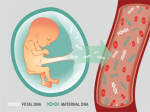
IVF and Reproductive health
Worrying about family planning and other issue understand the genetic complexity and get it treated
Infertility
 Infertility means not being able to get pregnant after one year of trying (or six months if a woman is 35 or older). Women who can get pregnant but are unable to stay pregnant may also be infertile
Infertility means not being able to get pregnant after one year of trying (or six months if a woman is 35 or older). Women who can get pregnant but are unable to stay pregnant may also be infertile
RPL
Recurrent miscarriage, also called recurrent pregnancy loss, is defined as two or more consecutive clinical pregnancy losses before 20 weeks gestation

NIPT
Noninvasive prenatal testing (NIPT), sometimes called noninvasive prenatal screening (NIPS), is a method of determining the risk that the fetus will be born with certain genetic abnormalities. This Abnormalities include Trisomy 13 , 18 and 21
ERS
Know your implantation period
- Embryo implantation depends on the quality of the ovum and endometrial receptivity. Endometrial receptivity is a temporary unique sequence of factors that make the endometrium receptive to embryonic implantation.
- Implantation window is a period during which the endometrium is optimally receptive to implanting blastocyst. The human endometrium is a dynamic tissue, it undergoes changes at multiple levels during the menstrual cycle in response to ovarian hormones and paracrine secretions. The endocrine and paracrine secretions control gene expression of the different endometrial cell types. The ability to identify the endometrial Window Of Implantation (WOI) in the clinical setting would enhance the outcome of fertility treatments such as IVF.
 PGD / PGS
PGD / PGS
PGD can be defined as a procedure of reproductive technology which involves the diagnosis of genetic defects before the implantation of the embryo created by In Vitro fertilization. Detection of genetic defects is done to prevent any sort of genetic disorders after the birth which are passed onto the child by the ancestors.\
Who all can be benefited from PGD?
- The list of patients who can have the benefits from PGD are as follows:
- Sex linked gene disorders carriers
- Females with the age 35 and above
- Individuals with chromosomal disorders
- Carriers of sex linked disorders
- Past history of failed IVF treatments
- History of miscarriage
- This process of PGD is also used for the identification of gender however, this identification if considered illegal if done for the discard of embryo on the basis of gender.
- Pre-Implantation Genetic Screening (PGS) allows for the screening of embryos during In Vitro Fertilisation (IVF) in order to identify abnormalities in the chromosomes caused by aneuploidy . These chromosomal abnormalities can become the primary reason of the failure of miscarriages or also lead to failure in implantation of the embryo.

